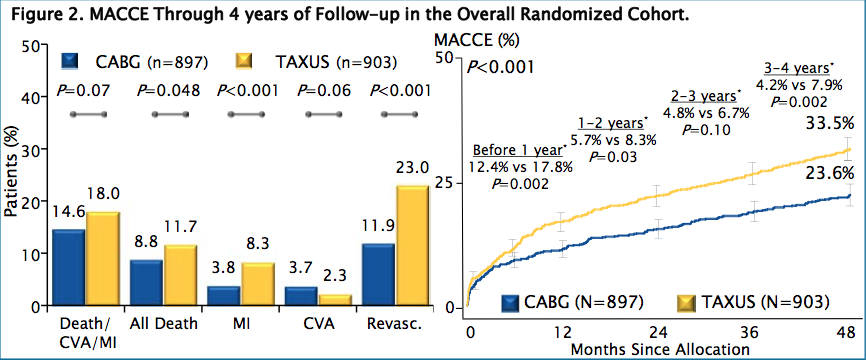A dramatic increase in percutaneous coronary intervention (PCI), coupled with a similar decrease in coronary artery bypass grafting (CABG) has characterized the treatment of coronary artery disease for the 20 years. The just released FREEDOM trial results[1] have once again confirmed that diabetic patients with coronary artery disease have better outcomes with CABG than with PCI – even if contemporaneous …
SYNTAX Trial: Four-year follow-up analysis
SYNTAX was an 1800-patient trial randomizing patients with left main coronary disease and/or three-vessel disease to either CABG or PCI using the Taxus drug-eluting stent (DES). Findings In patients with severe, multi-vessel coronary disease, coronary artery bypass grafting (CABG) continues as the standard of care of revascularization. Death and MI rates did become significantly greater in the PCI group after …
The FREEDOM Trial: Revascularization in Patients with Diabetes
The Future Revascularization Evaluation in Patients with Diabetes Mellitus: Optimal Management of Multivessel Disease (FREEDOM) study enrolled 1,900 patients over a 5-year period from 2005 through 2010. Contemporary PCI and CABG techniques and currently recommended ancillary medical therapies were examined to determine whether CABG or PCI with drug-eluting stents are the superior approach to revascularization in patients with diabetes and …
The Best Cardiology Blogs
Ask Dr T was nominated in September 2012 as one of The Best Cardiology Blogs on Internetmedicine, “where Internet meets medicine” in the company of others that include The American College of Cardiology, Dr. Topol, Dr. Cresman and Harvard Health Publications
Dick Cheney and modern heart failure treatment
Former Vice President Dick Cheney was released from the hospital on April 3rd, 2012, 10 days after getting a heart transplant. Cheney waited nearly two years for the transplant. During his life he sustained five heart attacks, the first at age 37 and the most recent one in 2010. What is remarkable about this is not his age (71), but …
Stenting for stable coronary artery disease is wrong!
In a January 4th, 2012 JAMA editorial, the authors describe that patients were not being helped by a variety of well-established procedures including stenting for stable coronary artery disease: “Percutaneous coronary intervention (stenting) performed for stable coronary artery disease… cost(s) billions of dollars and (has supported) the existence of (an) entire specialty for many years. Stable coronary artery disease accounted for …
Is HbA1c the gold standard for diagnosis of Diabetes?
HbA1c is not a sure-fire tool for Diabetes diagnosis.At the European Association for the Study of Diabetes meeting on HbA1c for diagnosis, many physicians did not trust glycated hemoglobin levels alone to diagnose diabetes, despite ADA guidelines. High-risk, pre-diabetic patients could be left untreated with an HbA1c of less than 6.5%, and a fasting Glucose or a Glucose tolerance test …
Medical therapy often superior than stenting
There is more and more evidence of the superiority of medical therapy over stenting, not only with coronary artery disease, but also with stenotic arteries in your brain: The 30-day rate of stroke or death associated with stenting (14.7%) is nearly 2.5 times as high as the 6% rate associated with stenting in high-risk patients with a 70 – 90 …
Left-main PCI is only appropriate for a minority of patients
An atricle published in Cardiovascular Business on November 8, 2011 is very much in-line with our previous publications on this website about optimal treatment of Coronary Artery Disease that includes a Left Main Stenosis and/or three vessel disease: SAN FRANCISCO—CABG is the preferred treatment strategy for patients with left main disease, according to Michael J. Mack, MD, president of the Society for Thoracic Surgeons …
Weight Gains After Dieting
As is well known, although restriction of diet often results in initial weight loss, more than 80 per cent of obese dieters fail to maintain their reduced weight. A new study from Australia involved 50 overweight or obese patients without diabetes in a 10-week weight-loss program using a very-low-energy diet. Levels of appetite-regulating hormones were measured at baseline, at the end of …



